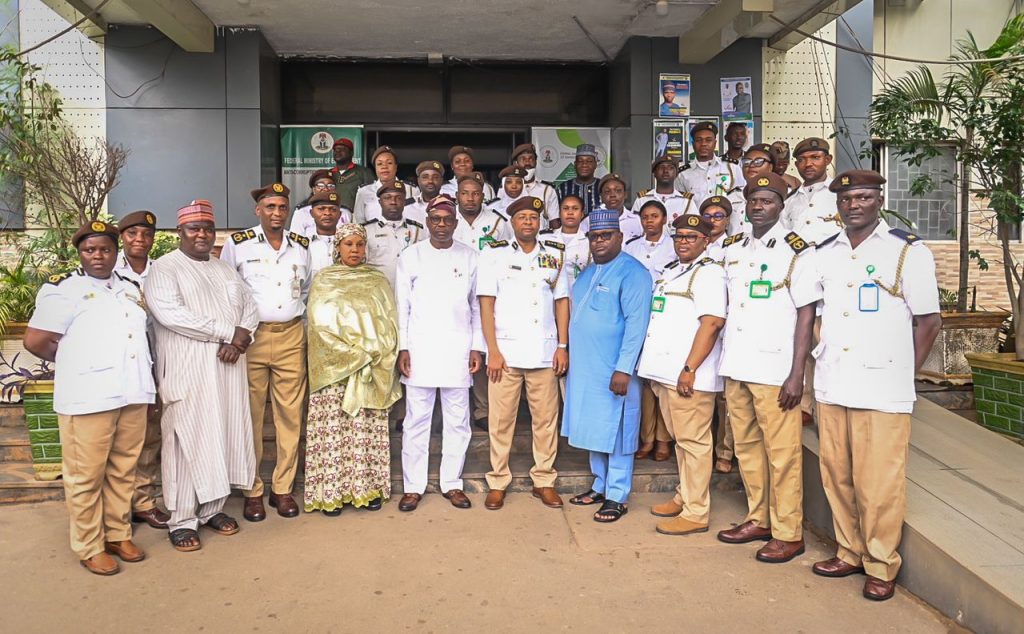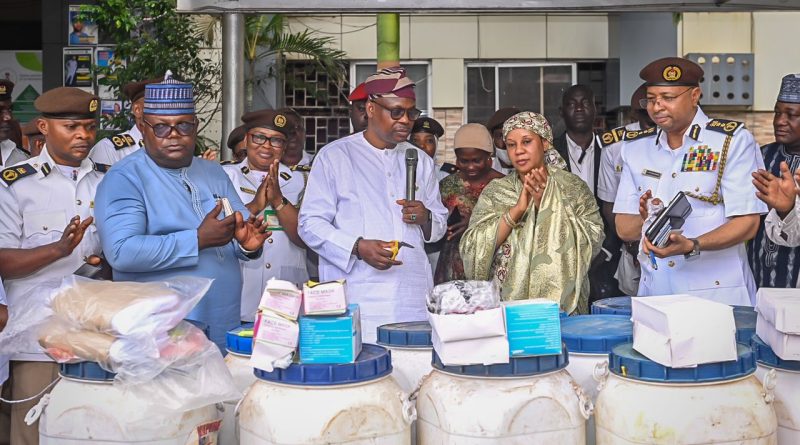Borno Flooding: Minister Says One Million People Are At the Risk of Cancer, Cholera, Diarrhea As He Highlights Environmental Health Intervention
The Minister of State for Environment, Iziaq Adekunle Salako, a Medical Doctor, on Wednesday said that over a million people especially in the North eastern part of Nigeria are at the risk of diseases such as Diarrhea, Cholera and even cancer! He stated this while highlighting some environmental and health intervention on the flooding that took place in Borno State, after the collapse of the Alau Dam on 10 September. NigerianEcho reports that at least 300 people have died and more than a million people displaced as a result of the flooding which the United Nations refugee agency in Nigeria has described as the worst to hit the city of Maiduguri in thirty years.
Salako said apart from the economic loss, this flood episode like others before, has potential to usher in perhaps more worrisome situations of deadly Flood-related Diseases and health conditions.
“It is imperative to sound some caution to the People, Authorities and Stakeholders to be wary of Diseases such as Diarrhea, Cholera that may occur in an epidemic proportion arising from the use of Water already contaminated for cooking and drinking. Similarly, Diseases like Malaria, Hook Worm and Tape Worm Diseases are likely to be on the rise on account of increase of Parasitic activities arising from the imbalance in the habitat of their Agents. Hepatitis A and B could spread in an acute form where people are bound to use water contaminated with faecal matter and/or when they rapidly have to share food and food containers that may have been contaminated with the Virus. Yet another group are Silicosis, Asbestosis, Asthma and Cancer which may prevail as a result of People’s exposure to Chemical Substances washed into Flood waters those impairing the Cardiopulmonary functions of the human system”, the Minister said.

He said that these diseases and health conditions are premeditated by factors inherent with flood situations – contamination of water by Micro-organisms ranging from Bacteria and Viruses thus causing water-borne infections; Insect-borne Parasites like Plasmodium carried by House Flies that cause vector-borne infections like Malaria and parasitic infections such as Ascariasis, Schistosomiasis caused by Helminths known as Ascaris lumbricoides and Flukes.
“It is well established that the flood waters which stagnate are breeding sites for insect vectors such as mosquitoes, helminths and microbes such as Escherichia coli, Vibrio cholera, Salmonella typhi, Hepatitis A & E viruses, Polio virus that lead to Diarrhea, Cholera, Typhoid Fever, Hepatitis A & E Diseases respectively. Food poisoning, chemical poisoning, arthritis, Rheumatism, allergic reactions, mycotoxins, etc. are also among the conditions negatively affecting human health arising from flooding.
“Similarly, physical, chemical and psychological hazards abound post flooding episodes. Top soils are washed into water bodies such as rivers, streams and ponds thereby aggravating the overflow of the banks, open wells also receive their fair share. In the same manner, solid wastes and debris are also introduced into such water bodies thereby introducing chemical substances. Fertilizers, herbicides and other agro allied products from flooded farmlands constitute chemical hazards which are introduced into water bodies as well. Specifically, contaminants such as heavy metals (Lead, Mercury, Arsenic, Cadmium), Nitrates and Nitrites, volatile organic compounds, Asbestos, Silicon, Chlorofluorocarbons pose grave risk to human health. In the same vein, radioactive materials washed from hospitals, construction sites, industries and mining sites among others impact the environment negatively. Injuries arising from accidents like fall, drowning in flood waters are hazards of public health importance. Additionally, as a result of these exposures, terrestrial and aquatic habitats are destroyed. Psychological hazards such as trauma, depression, stress, are common after-effects associated with flood disasters”, the Minister noted.

He said the consequence of these hazards could lead to disease conditions affecting populations exposed to flooding. He said the Increase insect bites and vermin attacks pose more danger on the affected population – venoms, secretions, toxins are introduced into the human body system causing blisters, skin rashes, dermatitis, fever, nausea, vomiting and even death. According to Salako, another important vector borne disease is Leptospirosis which is an upper respiratory tract infection caused by infected animals when human come in contact with excremental materials of dogs, rats, livestock and wildlife.

He said it is imperative for the Ministry to issue Environmental Health Advisory that will help mitigate the devastating effects associated with the menace of flooding.
At the Community level, he stated that the people should adopt the following mitigation strategies:
- Establish Environmental Health and Sanitation Committee to coordinate Community level Environmental Health response and liaise with appropriate authorities
- Ensure that public drains are opened and cleared of all kinds of debris to enable free flow of Water as effective drainage help in quick abatement of the flood waters
- Make adequate provision for evacuation routes and also pay attention to weather forecast to forestall re-occurrence
- Be on alert by continuously monitoring the level of all surface waters
- Introduce continuous Awareness creation in and around the community
- Report any action that may lead to further flooding to the local Authorities
- Encourage members of the Community to comply with flood alerts and warnings
- Work with the appropriate Organs of Government for rescue Operations
- Designate and properly manage Community waste dumpsites
- Coordinate provision of potable water supply
- Educate members of the communities on water treatment methods
- Enforce compliance with Sanitation and Hygiene measures
- Coordinate supplies from Support relief efforts.
At the family level, people are encouraged to adhere to these:
- Families/Households should screen their buildings to prevent invasion of dangerous and stray animals such as reptiles, arachnids, amphibians , rodents, and other terrestrial and aquatic animals associated with flooding
- Families should step up general cleaning of their surroundings to get rid of germs and filth
- Dumping of wastes in waterways should be stopped as the practice only aid further flooding
- Raise electrical outlets in their houses to avoid electrocution
- Sand bag their surroundings to avoid water entry
- Make provisions to treat water before consumption through Boiling, Chlorination etc
- Ensure that there no holes lead into their houses to avoid entry of Pests and Vermins
- Simulate evacuation and safety procedure in preparation for the next likely-to-happen event of flooding
- Volunteers should help neighbours, especially vulnerable populations
- Participate in community clean-up that will restore public spaces
- Provide Hand Washing Facilities for Family members’ Use
Preventive Measures at Personal Level:
- Wear protective gear like Gloves, masks, and boots
- Avoid electrical hazards – switch of power lines, flooded electrical outlets
- Be aware of wildlife like Snakes, rodents, and other displaced animals
- Manage stress by seeking support from family, friends, or professionals
- Stay informed by following updates from authorities
- Use safe water – Bottled or boiled water for drinking, cooking, and hygiene
- Maintain personal hygiene: Wash hands frequently.
- Prevent waterborne illnesses: Avoid contaminated water, food, and surfaces.
- Manage waste by properly disposing of human waste and hazardous materials
- Seek medical attention if injured or experiencing ill health
He said the advisory has been put together in form of handbills and will be translated into Hausa and other languages for circulation.
“In line with the presidential directives and in furtherance of the delivery of our Ministerial Mandates as part of the Key Priorities of President Ahmed Bola Tinubu’s Renewed Hope Agenda, the Ministry has mobilized technical and material support to the People and Government of Borno State to mitigate the negative impact of the Flood. A Team of experts ranging from Environmental Health Officers, Wildlife Conservationists, Pollution and Erosion Control Officers are being deployed to assist the Emergency Management Team in the collective amelioration of the situation”, the Minister concluded.




